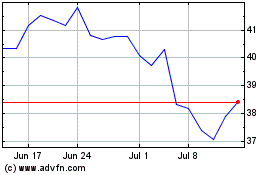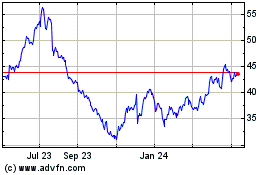US Aviation-Biofuel Production Could Be Poised To Take Flight
June 10 2011 - 4:05PM
Dow Jones News
Biofuel production in the U.S. has a mixed track record. But for
the aerospace sector, it is a dead serious business.
Fuel represents about 40% of airline carriers' total cost--and
oil that costs $100 a barrel is a major incentive for airlines and
aviation companies to find an alternative. Companies such as Boeing
Co. (BA), US Airways Group Inc. (LCC) and Alaska Airlines are
aggressively pursuing renewable jet fuel, or "biojet," made from
waste grease and vegetable oil to replace some of the 17 billion
gallons of petroleum-based fuel the aviation industry consumes
every year in the U.S.
"Our goal is to have 1% of all aviation fuel have some
bio-content within the next five years," said Billy Glover, vice
president of environment and aviation at Boeing, which has funded
biofuels studies and participated in test flights using renewable
jet fuel.
The aviation sector's keen interest in biofuels contrasts with
that of the greater consumer market, where renewable fuels seem to
have stalled. Corn ethanol, which represents 10% of fuel
consumption in the U.S., has been criticized for having a dubious
environmental record, and auto makers and refiners are resisting
U.S. government attempts to increase the amount of ethanol blended
into gasoline. Biodiesel production, a hot industry in 2007, has
ground to a halt. Some point to electric cars as being a better
alternative than biofuels to reduce fossil-fuel consumption in the
U.S.
But airlines, unable to electrify their planes, have been
pushing biojet fuel forward. On June 6, the renewable replacement
won approval for use in jet engines from ASTM International, the
international technical standards-setting group.
Biojet fuel is an advanced biofuel, chemically indistinguishable
from petroleum-based jet fuel. The high cost and decades-long
lifespan of aircraft make major changes in engine design
impractical, making "drop in" liquid biofuels that work with
existing infrastructure the best alternative, said Paul McElroy,
spokesman for Alaska Air Group Inc. (ALK), which operates Alaska
Airlines.
"There are many details that need to be addressed [with biojet],
but we believe this is certainly worth pursing," McElroy said.
One such detail is obtaining steady supply. Only a handful of
producers make the fuel, mostly in relatively small batches for
testing with the U.S. military. These include Solazyme Inc. (SZYM),
Honeywell International Inc. (HON) subsidiary UOM LLC and Dynamic
Fuels, a joint venture co-owned by Tyson Foods Inc. (TSN) and
Syntroleum Corp. (SYNM) that converts chicken fat into biojet.
Although Astmi's seal of approval for use of the fuel should
help to coax investors to the industry, production issues still
remain, including developing raw materials that will yield the most
amount of fuel. And some in the aviation industry believe the
military might have to prime the biojet production pump before the
fuel can conquer the wider market. Biojet currently can cost up to
five times more than petroleum-based jet fuel and won't fall in
price until production increases enough to reach economy of
scale.
Congress is currently mulling over bills introduced in May that
would allow the Department of Defense, the single-largest energy
consumer in the country, to extend its biofuel supply contracts to
15 years from the current five years.
If renewable jet-fuel production can ramp up enough to displace
even 1% of total aviation fuel needs, further growth would be
almost guaranteed, said Steve Lott, spokesman for airlines trade
group Air Transport Association.
"That first 1% is going to be the hardest," Lott said. "Once we
reach economy of scale, it will go that much faster."
-By Ben Lefebvre, Dow Jones Newswires; 713-547-9201;
ben.lefebvre@dowjones.com
Alaska Air (NYSE:ALK)
Historical Stock Chart
From Mar 2024 to Apr 2024

Alaska Air (NYSE:ALK)
Historical Stock Chart
From Apr 2023 to Apr 2024
